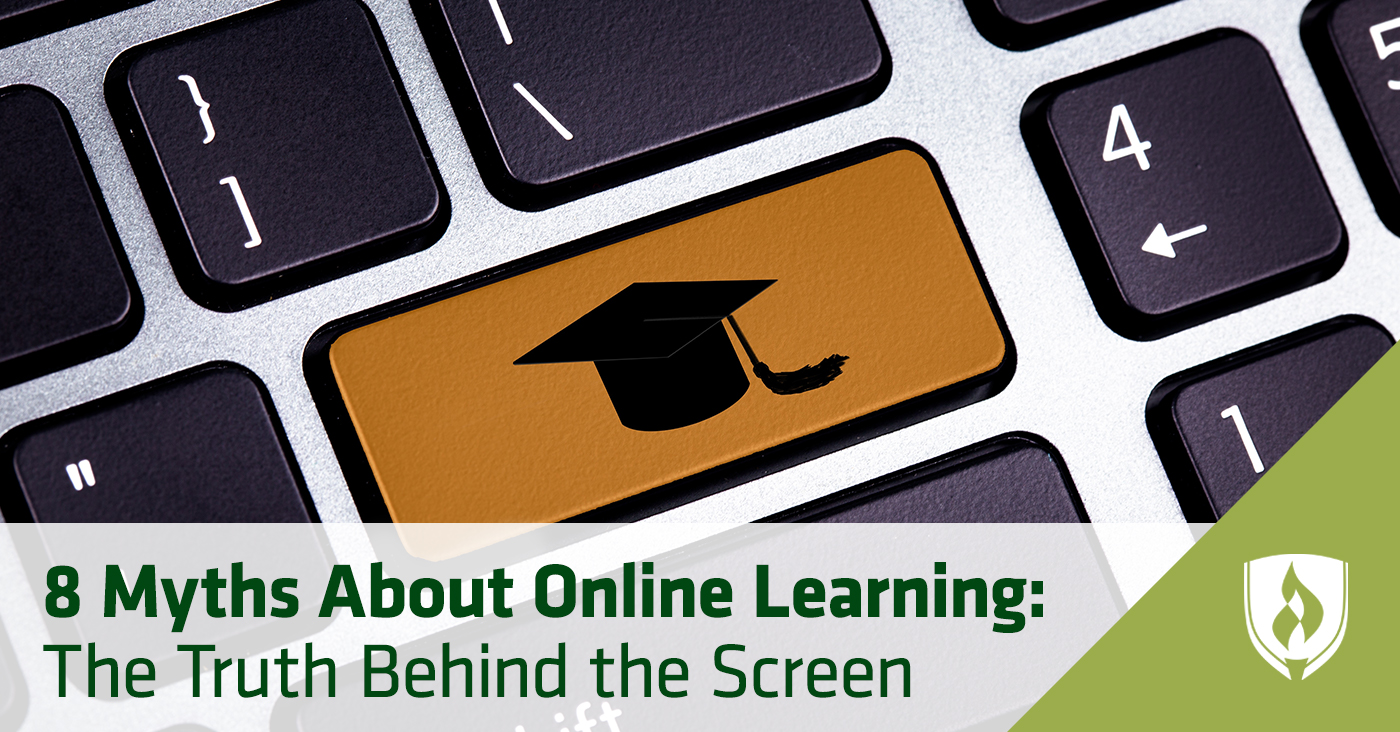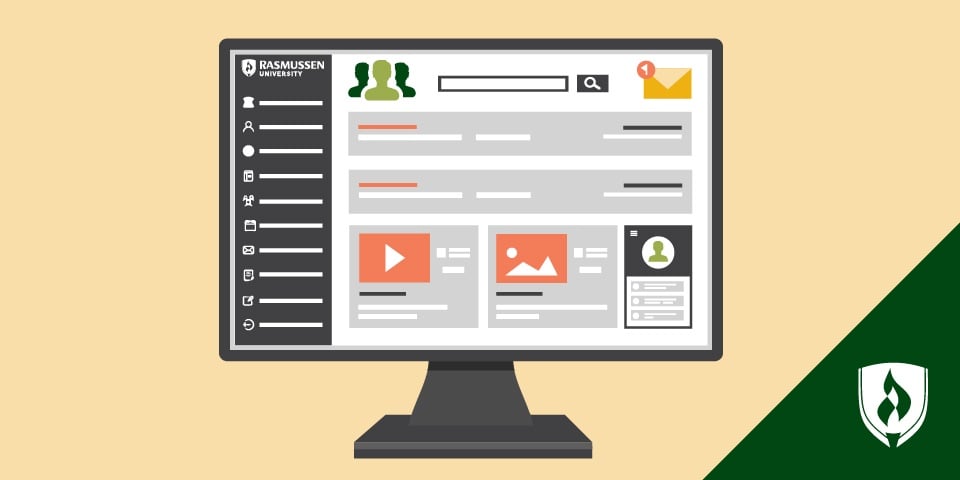
When you envision going to school, you picture the traditional classroom environment—complete with a whiteboard, desks, pencils and notebooks. That’s how a classroom has looked for decades, and it’s hard to really picture education in any other way.
But with the increase in online college courses, you might be curious about your options. The convenience and flexibility of online learning is appealing, but is that format even effective? You don’t want a degree worth only the paper it’s printed on, you want the knowledge and the qualifications that come with a great academic program.
Your concerns might stem from some of the common myths about online learning. If there’s any chance these misconceptions stand in the way of you and your dream career, it’s time to bring them to the light.
“As a classroom teacher, I went into [online education] with a whole lot of skepticism, but I walked away a serious believer in the potential of programs like it,” says Rob Sheppard, founder and CEO of Ginseng English. “I was honestly surprised that I liked it so much.”
If you’d like a better idea of what online learning is like from the inside, read on. We asked professionals in various industries who completed online programs to talk about what their experience was really like.
8 Online learning myths debunked
Part of learning is being willing to challenge your assumptions about a topic—and online learning is no different! Read on to see whether the truth behind any of these commonly held misconceptions about online learning will leave you thinking differently.
Online learning myth #1: You have to teach yourself the material
Just because you’re not physically sitting in front of your instructors, doesn’t mean they won’t be there to guide you along the way.
Online class instructors are responsible for engaging their students and teaching them the subject matter, just as they would in a brick-and-mortar class, according to Shekhar Regmi, Ed.D. lecturer and chief academic advisor at the UMass Amherst University Without Walls.
“I believe not attending classes in person can (at first glance) seem like a deficit,” says personal development coach Nichole Wesson. Because of this, Wesson says professors tend to put extra intention into the syllabus, unit organization and assignment instructions so everything is as guided as possible. “Just like in-person classes, it is up to the student to ask questions if something is not clear,” Wesson says.
Online learning myth #2: You’ll have no interaction with classmates
You can use technology to speak to a friend face to face across the globe or collaborate with a group of business partners, and you can also utilize it to interact with professors and classmates.
“Interaction was a fundamental part of my program,” Sheppard says, explaining that each student was required to post on course forums several times per week and meet with professors one on one occasionally.
“The forum posts were actually more interesting than just in-class conversations, in my opinion,” Sheppard says. “In writing everyone has a chance to gather their thoughts and express themselves on their own time and in a more deliberate manner than with real-time interaction.”
In a moderated online forum where everyone has to participate, you’ll likely get a better feel for who your classmates are than in a lecture hall where only a few students speak up. “Online discussions can give a lot more insight into people,” Wesson says. “There are rules and etiquette about how to communicate, and you learn quickly how people feel on a certain topic.”
Author Allison Bruning says her class was instructed to check the forum boards frequently in her online program. “The more we interacted, the more connected I felt with my classmates.”
Online learning myth #3: Professors are faceless
In a traditional brick-and-mortar university, professors often keep office hours where students can drop by, say hello and ask questions. Depending on the teacher, they might also be approachable after class or reachable by email. Interactions with professors do a lot to reinforce material and help you engage and learn. How does that all work in online learning?
Bruning says her professors connected with students via a program Facebook page as well as through their class platforms. “The faculty were very approachable. I am still friends with some of my professors.”
“Take full advantage of every opportunity to connect via social media,” Bruning suggests. “You just never know what types of friendships will be forged through both the discussion boards and social media.”
Online learning myth #4: You can’t build a network
Speaking of friendships, one of the underrated perks of education is the people you meet—and the connections they can bring into your life. Many people rely on college networks to land jobs and learn about solid opportunities. At first glance, that kind of relationship-building might seem hard in an online class, but Sheppard says the intentionality online platforms require could actually make network-building easier.
“My program was incredible for networking. Several of my instructors are leaders and celebrities within the field, and my program director does a fantastic job managing an engaged and supportive alumni community.” While Sheppard says this definitely is not true of all online programs, a good program will have attentive advisors and administrators (as well as instructors) who can offer career advice and connections.
Online learning myth #5: Online courses are easier than on-campus courses
We hate to burst your bubble, but if you’re enrolling in an accredited program, this is simply not the case! Perhaps reading this myth got you a little excited and hopeful that online education would be a simpler schooling option. Regmi argues that not only should students expect online courses to be just as challenging as their on-campus counterparts, but they should want them to be.
“College is expensive,” Regmi says. “Students are paying good money and they should expect to get their money’s worth.” Part of getting what you pay for is expecting to undergo challenging courses on your way to graduation.
“Instruction was a combination of recorded video mini-lectures and modules to be read through, along with lots of academic readings,” Sheppard says. “The whole thing was tough but very effective. I would caution that you really need to be able to manage your own time.” He explains that the perceived distance of online coursework makes you feel as though you can put it off.
“If you’re not a self-motivated person, I can see an online program being especially challenging.”
Online learning myth #6: You have to be a tech whiz to take online courses
You can order a pizza from your phone with a few simple taps on the screen. You share pictures and communicate with friends and family on social networks. You know that well-designed technology doesn’t have that steep of a learning curve. And platforms for online learning are becoming more sophisticated and designed for better student experiences.
Age or technical ability should never be an excuse for you to not pursue online learning options. In fact, Regmi shares that the oldest online student he’s ever worked with was 80 years old!
“If she could do it, anyone can,” Regmi adds.
Online learning myth #7: Online learning is all lecture
Kinesthetic learners, take heart! Video lectures are definitely a component of many programs, but online learning goes much deeper than that. Bruning says her online curriculum involved lots of hands-on work.
“I think the hands-on portion helped me the most. I learn best when I am guided to do something rather than being lectured about it,” Bruning says. “The lessons I learned have helped me in my writing career to become a better writer.”
In some online programs, you’ll be assigned projects that often mirror what you’ll do in a real work setting—this gives you a chance to apply what you’ve learned and really demonstrate your comprehension.
Online learning myth #8: Employers don’t value online degrees
When online learning was brand new, employers might have felt wary—especially in industries where a degree is a nonnegotiable qualification, such as education or healthcare. But for several years the popularity of online learning has been growing and what once seemed novel is downright common.
“As more and more employers and those with hiring authority have themselves earned degrees online, the stigma against online degrees is diminishing,” says Regmi. There are some cases where an employer might even consider an online education more valuable.
The virtual classroom simulates many of the modern technologies used in the workplace. It’s not uncommon for colleagues to communicate and collaborate online, so your online learning experience could prepare you for that interaction.
Making online learning work for you
Now you have a much better idea of what online learning is actually like. If you treat your program choice with careful consideration, just as you would a traditional school, you can have a great experience at a convenience that fits your life.
That flexibility is a huge plus for anyone trying to manage working full time while returning to school. For more advice on managing this tricky balance, visit our article “10 Tangible Tips to Balance Working Full-Time and Going to College.”
EDITOR’S NOTE: This article was originally published in 2015. It has since been updated to include information relevant to 2019.




